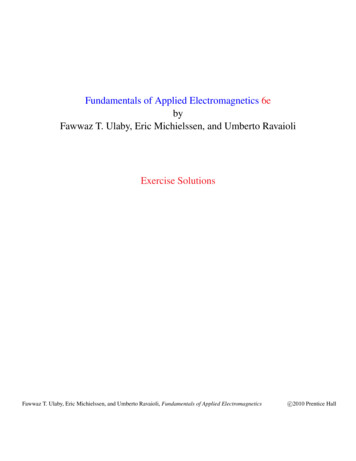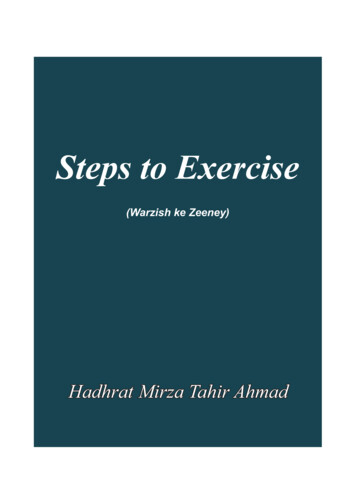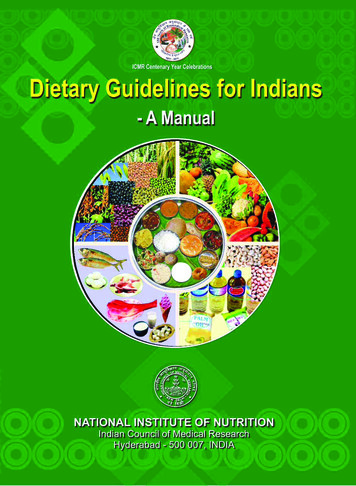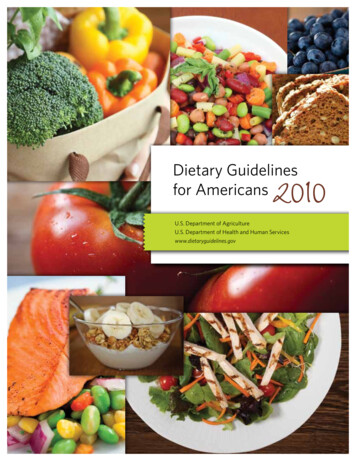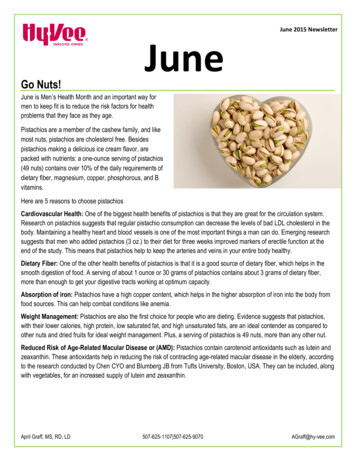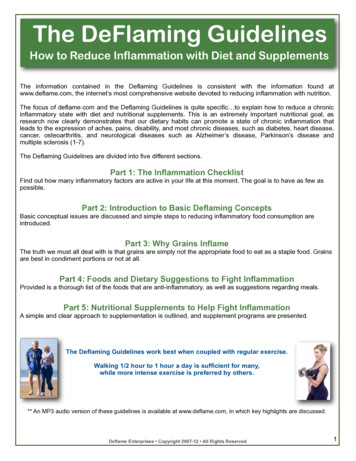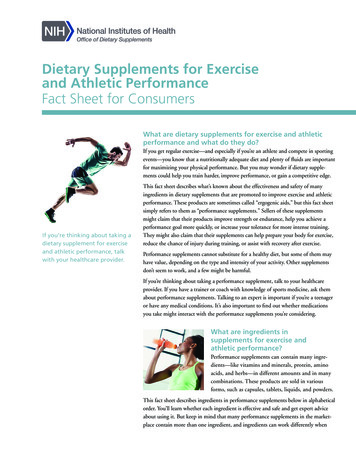
Transcription
Dietary Supplements for Exerciseand Athletic PerformanceFact Sheet for ConsumersWhat are dietary supplements for exercise and athleticperformance and what do they do?If you get regular exercise—and especially if you’re an athlete and compete in sportingevents—you know that a nutritionally adequate diet and plenty of fluids are importantfor maximizing your physical performance. But you may wonder if dietary supplements could help you train harder, improve performance, or gain a competitive edge.If you’re thinking about taking adietary supplement for exerciseand athletic performance, talkwith your healthcare provider.This fact sheet describes what’s known about the effectiveness and safety of manyingredients in dietary supplements that are promoted to improve exercise and athleticperformance. These products are sometimes called “ergogenic aids,” but this fact sheetsimply refers to them as “performance supplements.” Sellers of these supplementsmight claim that their products improve strength or endurance, help you achieve aperformance goal more quickly, or increase your tolerance for more intense training.They might also claim that their supplements can help prepare your body for exercise,reduce the chance of injury during training, or assist with recovery after exercise.Performance supplements cannot substitute for a healthy diet, but some of them mayhave value, depending on the type and intensity of your activity. Other supplementsdon’t seem to work, and a few might be harmful.If you’re thinking about taking a performance supplement, talk to your healthcareprovider. If you have a trainer or coach with knowledge of sports medicine, ask themabout performance supplements. Talking to an expert is important if you’re a teenageror have any medical conditions. It’s also important to find out whether medicationsyou take might interact with the performance supplements you’re considering.What are ingredients insupplements for exercise andathletic performance?Performance supplements can contain many ingredients—like vitamins and minerals, protein, aminoacids, and herbs—in different amounts and in manycombinations. These products are sold in variousforms, such as capsules, tablets, liquids, and powders.This fact sheet describes ingredients in performance supplements below in alphabeticalorder. You’ll learn whether each ingredient is effective and safe and get expert adviceabout using it. But keep in mind that many performance supplements in the marketplace contain more than one ingredient, and ingredients can work differently when
2 EXERCISE AND ATHLETIC PERFORMANCE SUPPLEMENTS FACT SHEET FOR CONSUMERSthey’re combined. Because most ingredient combinations havenot been studied, we don’t know how effective or safe they arein improving performance.You may be surprised to learn that makers of performancesupplements usually don’t carry out studies in people to findout whether their products really work and are safe. Whenstudies on performance supplement ingredients and ingredientcombinations are done (mainly by researchers at colleges anduniversities), they often involve small numbers of peopletaking the supplement for just a few days, weeks, or months.Much of the research is done in young healthy men, but notwomen, middle-aged and older adults, or teenagers. And often,studies haven’t looked at the use of supplement ingredients orcombinations in people involved in the same athletic activityas you. For example, the results from a study in weightliftersmight not apply to you if you are a distance runner.Ingredients in supplements for exerciseand athletic performanceAntioxidants(vitamin C, vitamin E,and coenzyme Q10)You breathe in more oxygenwhen you exercise. As a result,free radicals form and damagemuscle cells. Because antioxidantscan reduce free-radical damageto muscle, some people think that taking them in a supplementmight reduce muscle inflammation, soreness, and fatigue.Do they work?No. The free radicals that form when you exercise seem tohelp muscle fibers grow and produce more energy. Antioxidant supplements might actually reduce some of the benefitsof exercise, including muscle growth and power output. Also,they have little effect on aerobic fitness and performance inendurance activities like distance running.Are they safe?Everyone needs adequate amounts of vitamin C and vitaminE for good health. Getting too much of these nutrients can beharmful, but the amounts of vitamin C (about 1,000 milligrams)and vitamin E (about 500 IU) typically used in studies ofperformance supplements are below safe upper limits. The sideeffects from coenzyme Q10 can include tiredness, insomnia,headaches, and some gastrointestinal (GI) discomfort, butthese effects tend to be mild.Bottom lineThere’s little scientific evidence to support taking supplementscontaining vitamins C and E or coenzyme Q10 to improveperformance if you’re getting adequate amounts of thesenutrients from a nutritious diet.ArginineArginine is an amino acid in foods that contain protein,like meat, poultry, fish, eggs, dairy products, and legumes.A nutritious diet supplies about 4 to 5 grams a day. Supplement sellers claim that taking larger amounts of arginine insupplements improves performance, partly because the bodyconverts it into nitric oxide, which expands blood vesselsand increases blood flow. Increased blood flow helps deliveroxygen and nutrients to exercising muscle and speeds up theremoval of waste products that cause muscle fatigue.Does it work?Although the research is limited, arginine supplements seemto have little to no effect on strengthening and muscle-building exercises (like bodybuilding) or aerobic activities (likerunning and cycling). Studies have used 2 to 20 grams a dayof arginine for up to 3 months.Is it safe?Arginine supplements seem safe when users take up to 9grams a day for several days or weeks. Taking more can causeGI discomfort and can slightly lower blood pressure.Bottom lineThere’s little scientific evidence to support taking argininesupplements to increase strength, improve performance, orhelp tired and sore muscles recover after exercise.Beetroot or beet juiceBeets and beet juice are amongthe best food sources of nitrate.Beet juice might improveathletic performance becausethe body converts some of thisnitrate to nitric oxide, whichexpands blood vessels. Thisblood vessel expansion increases blood flow and the deliveryof oxygen and nutrients to exercising muscle. The expandedblood vessels also speed up the removal of waste products thatcause muscle fatigue.Does it work?Many, but not all, studies have found that beet juice canimprove performance and endurance in aerobic activities
3 EXERCISE AND ATHLETIC PERFORMANCE SUPPLEMENTS FACT SHEET FOR CONSUMERSlike running, swimming, cycling, and rowing. But whetherit helps with strengthening and bodybuilding exercises isn’tknown. Beet juice is more likely to improve the performanceof recreational exercisers than highly-trained athletes. Theusual approach in studies is for participants to drink 2 cups ofbeet juice about 2.5 to 3 hours before exercise.Is it safe?Drinking moderate amounts of beet juice is safe, but it canturn your urine pink or red.Bottom lineBeet juice might improve aerobic exercise performance ifyou’re recreationally active. But whether dietary supplementscontaining beetroot powder have the same effects as beet juiceisn’t known.Beta-alanineBeta-alanine is an amino acidin foods such as meat, poultry,and fish. People get up to about1 gram a day of beta-alanine,depending on their diet. Yourbody uses beta-alanine to makecarnosine in skeletal muscles.When you exercise intensely for several minutes, your musclesproduce lactic acid, which reduces muscular force and causestiredness. Carnosine reduces the buildup of lactic acid. Betaalanine supplements increase muscle carnosine levels by differentamounts, depending on the person.Does it work?Some, but not all, studies have shown that beta-alanine produces small performance improvements in swimming and teamsports, like hockey and football, that require high-intensity,intermittent effort over short periods. Whether beta-alaninehelps with endurance activities like cycling isn’t clear. It’s alsonot clear whether beta-alanine mainly benefits trained athletesor recreational exercisers. In most studies, participants took1.6 to 6.4 grams a day of beta-alanine for 4 to 8 weeks.Is it safe?Taking 800 milligrams or more beta-alanine can causemoderate to severe paresthesia, a tingling, prickling, orburning sensation in your face, neck, back of the hands, andupper trunk. This effect can last 60 to 90 minutes but is notconsidered serious or harmful. Taking divided doses or asustained-release form of beta-alanine can reduce or eliminatethis paresthesia. It isn’t known whether it’s safe to take betaalanine supplements daily for more than several months.Bottom lineSports-medicine experts disagree on the value of taking betaalanine supplements to enhance performance in high-intensity,intermittent activities. The International Society of SportsNutrition recommends that if you are healthy and want totry beta-alanine supplements, take a daily loading dose of 4to 6 grams per day (in divided doses with meals) for at least 2weeks to see if it helps.Beta-hydroxy-betamethylbutyrate (HMB)Your body converts a smallamount of leucine, one ofthe amino acids in foods andprotein powders, to HMB.Your liver then converts theHMB into another compoundthat experts think helps muscle cells restore their structureand function after exercise. HMB also helps build protein inmuscle and reduces muscle-protein breakdown.Does it work?It’s hard to know whether you might benefit from usingHMB supplements because the research on these supplementshas included adults of very different ages and fitness levelswho took widely varying doses for different amounts of time.Overall, HMB seems to speed up recovery from exercise that’sintense enough and long enough to cause muscle damage.Therefore, if you’re a trained athlete, you’ll need to exertyourself more than recreationally active people to cause themuscle damage that HMB might help treat.Is it safe?Studies haven’t reported any side effects in adults taking 3grams per day of HMB for up to 8 weeks.Bottom lineIt’s not clear whether taking HMB supplements will improveathletic performance. The International Society of SportsNutrition recommends that if you are a healthy adult whowants to try HMB supplements, to take 3 grams per day inthree equal servings of 1 gram for at least 2 weeks to see if ithelps. HMB comes in two forms: one with calcium and onewithout. A dose of 3 grams of the type with calcium suppliesabout 400 milligrams of calcium.
4 EXERCISE AND ATHLETIC PERFORMANCE SUPPLEMENTS FACT SHEET FOR CONSUMERSBetaineYour body makes betaine, andit is also found in foods such asbeets, spinach, and whole-grainbread. You get about 100 to300 milligrams a day of betainewhen you eat a nutritious diet.How betaine supplementsmight affect or improve your performance isn’t known.Does it work?Only a few, mostly small, studies have evaluated betaine as aperformance supplement. Most of these studies examined the useof betaine supplements to improve strength and powerperformance in bodybuilders. The studies found either noperformance improvements or only modest ones. Participants inthese studies took 2 to 5 grams a day of betaine for up to 15 days.Is it safe?The few studies in which athletes took betaine supplementsdidn’t find any side effects. But there hasn’t been enoughresearch to know for sure whether it’s really safe.Bottom lineThere’s little scientific evidence to support taking betaine supplements to improve performance if you eat a nutritious diet.Branched-chain aminoacids (BCAAs)The amino acids leucine, isoleucine, and valine are known asBCAAs. Animal foods, like meat,fish, and milk, contain BCAAs.Your muscles can use these threeamino acids to provide energyduring exercise. Leucine might also help build muscle.Do they work?There’s little evidence that BCAA supplements improve performance in endurance activities like distance running. BCAAsupplements might help increase your muscle size and strengthtogether with a weight-training program. But it isn’t clearwhether taking BCAA supplements will help you build moremuscle than just eating enough high-quality protein foods.Are they safe?A nutritious diet with enough protein can easily provide 10to 20 grams a day of the BCAAs. Taking up to another 20grams a day of BCAAs in supplements seems to be safe.Bottom lineThere’s not much scientific evidence to support taking BCAAsupplements to improve performance, build muscle, or help tiredand sore muscles to recover after exercise. Eating foods containingprotein automatically increases your intake of BCAAs.CaffeineCaffeine is a stimulant inbeverages (like coffee, tea, andenergy drinks) and in herbs(such as guarana and kola nut).Caffeine is also added to somedietary supplements. Moderateamounts of caffeine mightincrease your energy levels and reduce fatigue for several hours.Does it work?Caffeine might improve endurance, strength, and powerin team sports. It’s most likely to help with enduranceactivities (such as distance running) and sports that requireintense, intermittent effort (like soccer and tennis). Caffeinedoesn’t help with short, intense exercise like sprinting orweightlifting. People have different responses to caffeine. Itdoesn’t boost performance in everyone, or may only slightlyboost performance.The usual dose of caffeine to aid performance is 2 to 6 milligrams per kilogram of body weight, or about 210 to 420mg caffeine for a 154-pound person. (By comparison, a cupof coffee has about 85 to 100 milligrams of caffeine.) Takingmore probably doesn’t improve performance further and canincrease the risk of side effects.Is it safe?Caffeine intakes of up to 400 to 500 milligrams a day seemsafe in adults. Teenagers should limit their caffeine intake tono more than 100 milligrams a day. Taking 500 milligrams ormore a day can reduce rather than improve physical performance, disturb sleep, and cause irritability and anxiety. Taking10,000 milligrams or more in a single dose (one tablespoon ofpure caffeine powder) can be fatal.Bottom lineSports-medicine experts agree that caffeine can help you exercise at the same intensity level for longer and reduce feelingsof fatigue. They suggest taking 2 to 6 milligrams per kilogramof body weight 15 to 60 minutes before you exercise. TheNational Collegiate Athletic Association and InternationalOlympic Committee limit the amount of caffeine that athletescan take before a competition.
5 EXERCISE AND ATHLETIC PERFORMANCE SUPPLEMENTS FACT SHEET FOR CONSUMERSCitrullineCitrulline is an amino acid that your body produces; it is alsopresent in some foods. Your kidneys convert most citrullineinto another amino acid, arginine. Your body then transformsthe arginine into nitric oxide, which expands blood vessels.This expansion increases blood flow and the delivery of oxygenand nutrients to exercising muscles and speeds up the removalof waste products that cause muscle fatigue.Does it work?The research on citrulline as a performance supplement is limited. The few studies find that citrulline might help improve,hinder, or have no effect on performance. In these studies,participants took up to 9 grams of citrulline for 1 day or 6grams per day for up to 16 days.Is it safe?There isn’t enough research on citrulline to know for surewhether it’s safe. Some users have reported that it can causestomach discomfort.Bottom lineThere’s not much scientific evidence to support taking citrulline supplements to improve exercise or athletic performance.CreatineCreatine is a compound thatis stored in your muscles andsupplies them with energy. Yourbody produces some creatine(about 1 gram a day), and youget some creatine from eatinganimal-based foods, such asbeef and salmon (about 500 milligrams in a 4-ounceserving). But it is only when you take much larger amountsof creatine from dietary supplements that it might improvecertain types of performance.Does it work?Creatine supplements can increase strength, power, andthe ability to contract muscles for maximum effort. Butthe extent of performance improvements from creatinesupplements differs among individuals.Use of creatine supplements for several weeks or months canhelp with training. Overall, creatine enhances performanceduring repeated short bursts of intense, intermittent activity(lasting up to about 2.5 minutes at a time), such as sprintingand weight lifting. Creatine seems to have little value for endurance activities, such as distance running, cycling, or swimming.Is it safe?Creatine is safe for healthy adults to take for several weeks ormonths. It also seems safe for long-term use over several years.Creatine usually causes some weight gain because it increaseswater retention. Rare individual reactions to creatine includesome muscle stiffness and cramps as well as GI distress.Bottom lineSports-medicine experts agree that creatine supplements canimprove performance in activities that involve intense effortfollowed by short recovery periods. It can also be valuable intraining for certain athletic competitions. In studies, peopleoften took a loading dose of about 20 grams per day of creatine(in four equal portions) for 5 to 7 days and then 3 to 5 gramsa day. Creatine monohydrate is the most widely used andstudied form of creatine in supplements.Deer antler velvetDeer antler velvet supplements are made from the antlers ofdeer or elk before the antlers turn into bone. Deer antlers mightcontain growth factors that could promote muscle growth.Does it work?There’s been little research on use of deer antler velvet to improve performance in either strength or endurance activities.The few published studies have found no benefit from takingthe supplement.Is it safe?Deer antler velvet hasn’t been studied enough to knowwhether taking it is safe.Bottom lineThere’s no scientific evidence to support taking deer antlervelvet supplements to improve exercise or athletic performance.Dehydroepiandrosterone (DHEA)DHEA is a steroid hormoneproduced by the adrenal glands.Your body converts someDHEA into testosterone, themale hormone that enhancesmuscle size and strength.Does it work?There’s been little study of the use of DHEA supplements toimprove performance. The few published studies (all in men)have found no benefit from taking the supplement. Musclesize or strength and aerobic capacity didn’t improve, and testosterone levels didn’t rise.
6 EXERCISE AND ATHLETIC PERFORMANCE SUPPLEMENTS FACT SHEET FOR CONSUMERSIs it safe?DHEA hasn’t been studied enough to know whether it’s safeto take. Two small studies in men found no side effects. But inwomen, taking DHEA supplements for months can increasetestosterone levels, which can cause acne and facial hair growth.Bottom lineThere’s no scientific evidence to support taking DHEA toimprove exercise or athletic performance. The National Collegiate Athletic Association and the World Anti-Doping Agencyprohibit the use of DHEA in athletic competitions.GinsengGinseng is the root of a plantused for thousands of years intraditional Chinese medicine.Some experts believe thatPanax (also known as Chinese,Korean, Japanese, or American)ginseng might improve staminaand vitality. Siberian or Russian ginseng has been used tofight fatigue and strengthen the immune system.Does it work?Several small studies have examined whether Panax or Siberianginseng supplements can improve performance. This researchprovides little evidence that various doses and preparationsof these supplements improve performance in athletes orrecreational exercisers.Is it safe?Both Panax and Siberian ginseng seem to be safe. However,ginseng supplements can cause headaches or GI effects anddisturb sleep.Bottom lineThere’s little scientific evidence to support taking ginsengsupplements to improve exercise or athletic performance.GlutamineGlutamine is an amino acidthat your body uses to produceenergy. Adults consume about3 to 6 grams a day from proteincontaining foods such as meat,poultry, fish, eggs, dairy products, and legumes. Your bodyalso makes some glutamine, mainly from branched-chainamino acids (BCAAs).Does it work?Only a few studies have examined the use of glutaminesupplements for improving performance in strengthening andmuscle-building exercises (like bodybuilding) and for recoveringfrom these exercises (for example, by reducing muscle soreness).Glutamine has either no effect or provides only a small benefit.Is it safe?Studies haven’t reported any side effects from the use of up to45 grams a day of glutamine for several weeks in adults.Bottom lineThere’s little scientific evidence to support taking glutaminesupplements to improve exercise or athletic performance.IronIron is a mineral thatdelivers oxygen to musclesand tissues throughout yourbody. Cells also need iron toturn food into energy. Irondeficiency, especially withanemia, limits your ability toexercise and be active because it makes you tired and reducesyour performance.The recommended amount of iron to get each day is11 milligrams for teenage boys, 15 milligrams for teenage girls,8 milligrams for men to age 50, 18 milligrams for women toage 50, and 8 milligrams for older adults of both sexes. Recommended amounts are even higher for athletes, vegetarians,and vegans. Teenage girls and premenopausal women have thegreatest risk of not getting enough iron from their diets.Does it work?For people with iron deficiency anemia, taking an ironsupplement will probably improve performance in bothstrength and endurance activities. But if you get enoughiron from your diet, taking extra iron won’t help. It’s notclear whether milder iron deficiency without anemia reducesexercise and athletic performance.Is it safe?Taking less than 45 milligrams of iron in a supplement issafe for teenagers and adults. Higher doses can cause upsetstomach, constipation, nausea, abdominal pain, vomiting, andfainting. However, doctors sometimes prescribe large amountsof iron for a short time to treat iron-deficiency anemia.
7 EXERCISE AND ATHLETIC PERFORMANCE SUPPLEMENTS FACT SHEET FOR CONSUMERSBottom lineTaking enough iron in supplements to treat iron-deficiencyanemia improves exercise capacity. But a health care providershould diagnose this condition before you start taking ironsupplements. If you want to improve your athletic performance, you should eat a healthy diet containing foods richin iron, such as lean meats, seafood, poultry, beans, nuts, andraisins. If needed, an iron-containing dietary supplement canhelp you get the recommended amount of iron.ProteinProtein helps to build, maintain, and repair your muscles. Itimproves your body’s response toathletic training and helps shortenthe time you need to recover afterexercise. Protein is made fromamino acids. Your body makessome amino acids but needs to get others (known as essentialamino acids or EAAs) from food. Animal foods like meat, poultry,fish, eggs, and dairy products contain all of the EAAs. Plant foodslike grains and legumes contain different EAAs, so eating a dietcontaining different types of plant-based foods is one way toget all EAAs. Most protein powders and drinks contain whey, aprotein in milk that provides all the EAAs.Does it work?Adequate protein in your diet provides the EAAs necessaryfor making muscle proteins and reduces the breakdown ofproteins in your muscles. Athletes need about 0.5 to 0.9 gramsof protein per pound of body weight a day (or about 75 to 135grams for a person weighing 150 pounds). You might needeven more for a short time when you’re training intensely orif you reduce your food intake to improve your physique orachieve a competition weight.Is it safe?High intakes of protein seem to be quite safe, but there is nobenefit to consuming more than recommended amounts.Bottom lineIf you are an athlete, you can probably eat enough foods thatcontain protein to meet your needs for protein. If needed,protein supplements and protein-fortified food and beverageproducts can help you get enough protein. Sports-medicineexperts recommend that athletes consume 0.14 grams ofprotein per pound of body weight (about 20 grams for a personweighing 150 pounds) of high-quality protein (from animalfoods and/or a mix of different plant foods) every 3 to 5 hours,including before sleep and within 2 hours after exercising.QuercetinQuercetin is a compound found in fruits, vegetables, andsome beverages (like tea). Some experts suggest that quercetin supplements increase energy production in muscle andimprove blood flow throughout your body. A nutritious dietprovides up to about 13 milligrams a day of quercetin.Does it work?There’s limited research on the use of quercetin supplementsto improve performance. The studies found that any benefits,when they occur, tend to be small. In these studies, participants took about 1,000 milligrams a day of quercetin for up to8 weeks.Is it safe?The studies of quercetin supplements didn’t find any sideeffects in the athletes who took them. But quercetin hasn’tbeen studied enough to know whether it’s really safe.Bottom lineThere’s little scientific evidence to support taking quercetinsupplements to improve exercise or athletic performance.RiboseRibose is a natural sugar yourbody makes that helps withenergy production in muscle.Some scientists believe thatribose supplements help musclesproduce more energy.Does it work?There’s been little study of the use of ribose supplements toimprove performance. The few published studies in bothtrained athletes and occasional exercisers have shown little ifany benefit from doses ranging from 625 milligrams to 10,000milligrams a day for up to 8 weeks.Is it safe?The studies of athletes taking ribose supplements have foundno side effects. But ribose hasn’t been studied enough to knowwhether it’s really safe when taken in large amounts for severalmonths or more.Bottom lineThere’s very little scientific evidence to support taking ribosesupplements to improve exercise or athletic performance.
8 EXERCISE AND ATHLETIC PERFORMANCE SUPPLEMENTS FACT SHEET FOR CONSUMERSSodium bicarbonateSodium bicarbonate is commonly known as baking soda.Exercising intensely over severalminutes causes muscles to produce acids, such as lactic acid,that reduce muscle force andcause tiredness. Sodium bicarbonate can reduce the buildup of these acids.Does it work?Studies show that athletes who take sodium bicarbonate mightimprove their performance a little in intense, short-termactivities (like sprinting and swimming) and in intermittentlyintense sports (like tennis and boxing). But different athletesrespond differently to sodium bicarbonate. Sodium bicarbonate might actually hinder performance in some people.The usual dose taken is 300 milligrams per kilogram of bodyweight, or about 4 to 5 teaspoons of baking soda. Some peoplefind this amount of sodium bicarbonate, dissolved in liquid,too salty to drink.Is it safe?Sodium bicarbonate can cause GI distress, including nauseaand vomiting, and weight gain due to water retention. It is alsohigh in sodium (1,260 milligrams per teaspoon).Bottom lineSodium bicarbonate might provide some performance benefitin strenuous exercise that lasts several minutes and in sportsthat require intermittent, intense activity, especially for trainedathletes. However, in some people, sodium bicarbonate providesno performance benefit, and it can even reduce performance.Tart or sour cherryTart or sour cherries of theMontmorency variety containcompounds that might help yourecover from strenuous exercise.Specifically, these cherries mighthelp to reduce pain, muscledamage from strength-relatedactivities, and lung trauma from endurance activities thatrequire deep, heavy breathing.Does it work?There’s limited research on tart cherry as a performance supplement. The studies that have been done suggest that it mighthelp bodybuilders recover their strength faster and feel lessmuscle soreness after exercising. The supplements could alsohelp runners race faster and be less likely to develop a cold orrespiratory problem after a marathon. The typical dose is about2 cups of juice or 500 milligrams of tart-cherry-skin powder fora week before the exercise and for 2 days afterwards.Is it safe?Studies of tart-cherry products in athletes have not found anyside effects. But the safety of tart-cherry supplements has notbeen well studied.Bottom lineThere’s limited scientific evidence to support taking tartcherry products to improve exercise and athletic performance.Tribulus terrestrisTribulus terrestris is a plantcontaining compounds thatsome sellers claim can improveperformance by increasing levelsof several hormones, includingthe male hormone testosterone.Does it work?There’s limited research on the use of Tribulus terrestris supplements to increase strength or muscle mass. The few studiesinvestigating it did not find that it had any benefit.Is it safe?Tribulus terrestris hasn’t been studied enough to knowwhether it’s safe. Studies in animals show that high doses cancause heart, liver, and kidney damage.Bottom lineThere’s no scientific evidence to support taking Tribulusterrestris supplements to improve exercise or athleticperformance. Some sports-medicine experts advise againsttaking any dietary supplements claimed to boost testosterone.
9 EXERCISE AND ATHLETIC PERFORMANCE SUPPLEMENTS FACT SHEET FOR CONSUMERSHow does the U.S. governmentregulate dietary supplements for exerciseand athletic performance?The U.S. Food and DrugAdministration (FDA)regulates dietary supplementsfor exercise and athleticperformance differently fromprescription or over-the-counterdrugs. As with other dietarysupplements, the FDA doesnot test or approve performance supplements before theyare sold. Manufacturers are responsible for making sure thattheir supplements are safe and that the claim
ing exercises (like bodybuilding) or aerobic activities (like running and cycling). Studies have used 2 to 20 grams a day of arginine for up to 3 months. Is it safe? Arginine supplements seem safe when users take up to 9 grams a day for several days or weeks. Taking more can cause GI disc
